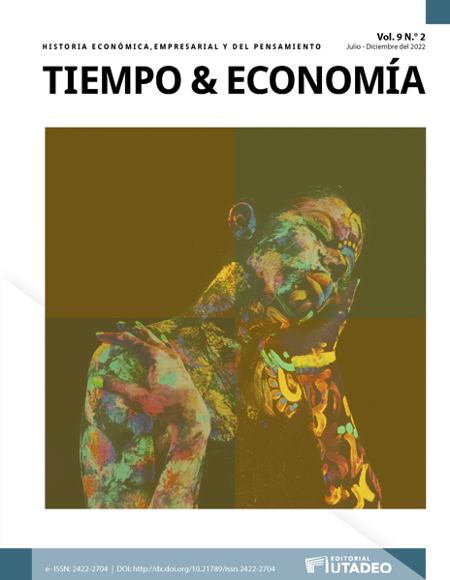
Esta obra está bajo una licencia internacional Creative Commons Atribución-NoComercial-CompartirIgual 4.0.
Esta obra está bajo una licencia internacional Creative Commons Atribución-NoComercial-CompartirIgual 4.0.
Resumen
En este estudio se discuten los factores que explican las movilizaciones feministas de 2004 a 2018 en América Latina. Se plantean las siguientes hipótesis: es mayor el porcentaje de las mujeres que protestan con respecto al de los hombres cuando aumenta el nivel educativo; es mayor el porcentaje de las mujeres que protestan con respecto al de los hombres cuando aumenta la participación de las mujeres en el mercado laboral, y es mayor el porcentaje de las mujeres que protestan con respecto al de los hombres cuando aumenta la participación en asociaciones; esto da pie a una movilización institucionalizada y organizada, que visibiliza a las mujeres fuera del ámbito doméstico, “las saca del hogar”. Los principales resultados apoyan las hipótesis. Además, se muestra que la naturaleza de la asociación a la cual se pertenece afecta positivamente el nivel de protesta, independientemente de su naturaleza.
Citas
Barkan, S. E. (2004). Explaining Public Support for the Environmental Movement: A Civic Voluntarism Model. Social Science Quarterly, 85(4), 913-937. https://doi.org/10.1111/j.0038-4941.2004.00251.x
Blofield, M., Ewig, C., & Piscopo, J. (2017). The Reactive Left: Gender Equality and the Latin American Pink Tide. Social Politics: International Studies in Gender, State & Society, 24(4), 345-369. https://doi.org/10.1093/sp/jxx016
Brannen, S., Haig, C., & Schmidt, K. (2020). The Age of Mass Protests. Understanding and Escalating Global Trend. CSIS - Center for Strategic & International Studies.
Burns, N., Schlozman, K. L., & Verba, S. (2001). The Private Roots of Public Action: Gender, Equality, and Political Participation. Harvard University Press.
Castro, L. (2018). La acción colectiva feminista, ¿de la lucha de clases a la lucha de géneros? Aportes para la comprensión práctica de los movimientos sociales: el caso “Ni Una Menos”. CienciaPolítica, 13(26), 19-61. https://doi.org/10.15446/cp.v13n26.67977
Cerva-Cerna, D. (2021). Criminalización de la protesta feminista: el caso de las colectivas de jóvenes estudiantes en México. Revista de Investigaciones Feministas, 12(1), 115-125. https://doi.org/10.5209/infe.69469
Guo, J., Liu, N., Wu, Y., & Zhang, C. (2020). Why do citizens participate on government social media accounts during crises? A civic voluntarism perspective. Information & Management, 58(1), 1-12. https://doi.org/10.1016/j.im.2020.103286
Inglehart, R., & Norris, P. (2003). Rising Tide: Gender Equality and Cultural Change Around the World. Cambridge University Press.
Kanai, A. (2017). Beyond Repudiation: The Affective Instrumentalisation of Feminism in Girlfriendly Spaces. Australian Feminist Studies, 32(93), 240-258. https://doi.org/10.1080/08164649.2017.1407641
Kern, A., Marien, S., & Hooghe, M. (2015). Economic crisis and levels of political participation in Europe (2002-2010): The role of resources and grievances. West European Politics, 38(3), 465-490. https://doi.org/10.1080/01402382.2014.993152
Littler, J., & Rottenberg, C. (2020). Feminist solidarities: Theoretical and practical complexities. Gender Work Organ, 28(3), 1-14. https://doi.org/10.1111/gwao.12514
Mazur, A. G., McBride, D. E., & Hoard, S. (2016). Comparative strength of womens movements over time: conceptual, empirical, and theoretical innovations. Politics, Groups, and Identities, 4(4), 652-676. https://doi.org/10.1080/21565503.2015.1102153
Natalucci, A., & Rey, J. (2018) ¿Una nueva oleada feminista? Agendas de género, repertorios de acción y colectivos de mujeres (argentina, 2015-2018). Revista de estudios políticos y estratégicos, 6(2): 14-34.
Reyes-Housholder, C., & Roque, B. (2019). Chile 2018: desafíos al poder de género desde la Calle hasta la Moneda. Revista de ciencia política, 39(3), 191-215. http://dx.doi.org/10.4067/S0718-090X2019000200191
Serafini, P. (2020). “A rapist in your path”: Transnational feminist protest and why (and how) performance matters. European Journal of Cultural Studies, 23(2), 290-295. https://doi.org/10.1177%2F1367549420912748
University of Vanderbilt. (2004). LAPOP. https://www.vanderbilt.edu/lapop/
University of Vanderbilt. (2006). LAPOP. https://www.vanderbilt.edu/lapop/
University of Vanderbilt. (2008). LAPOP. https://www.vanderbilt.edu/lapop/
University of Vanderbilt. (2010). LAPOP. https://www.vanderbilt.edu/lapop/
University of Vanderbilt. (2012). LAPOP. https://www.vanderbilt.edu/lapop/
University of Vanderbilt. (2014). LAPOP. https://www.vanderbilt.edu/lapop/
University of Vanderbilt. (2016). LAPOP. https://www.vanderbilt.edu/lapop/
University of Vanderbilt. (2018). LAPOP. https://www.vanderbilt.edu/lapop/

 PDF
PDF
 FLIP
FLIP












